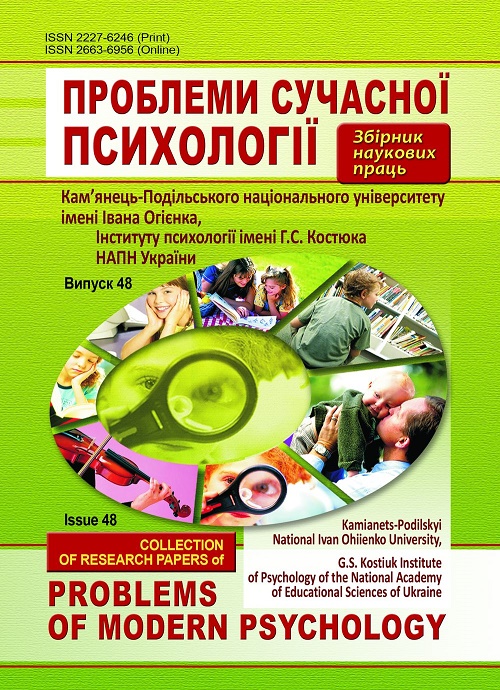Age Peculiarities of Psychological Adaptation of Ukrainian Winterers for Life in Antarctic Conditions
DOI:
https://doi.org/10.32626/2227-6246.2020-48.228-252Keywords:
adaptation, adaptability, life in Antarctic, readiness, preparation for extreme activity, age groups of adulthood.Abstract
The peculiarities of winterers’ psychological adaptation to extreme conditions
of life article are discussed in the article. In winter Ukrainian polar explorers,
who make researches by the directions consolidated by the State Program, stay
long on the limited territory, so that they need adaptation to social isolation and
psychological deprivation. In addition, the adaptation of winterers takes place
in the severe climate, and it much depends on the readiness of the participants
of expedition to the fulfillment of professional responsibilities in the extreme
conditions.
The aim of the article is to present theoretical bases and practical results
of researches on age peculiarities of psychological adaptation of Ukrainian
winterers for life in Antarctic conditions on the example of the last 9 expeditions
to the Ukrainian Antarctic station «Academician Vernadskyі».
Methods. The complex of methods of psychological researches of
adaptation processes of personality of a certain age is used. The experiment
involved 70 winterers who have been in Antarctica during the year from 2011
to 2019.
The results of the research. The results of empirical studies on adaptation
rates in winterers of different age groups for previous representatives are
presented. After the comparison of survey results during the expedition the
presence of changes in psychological characteristics was revealed. It was found
that during the stay in Antarctica, some winterers experienced psycho-emotional
problems, and revealed typical psychological and psychophysiological changes.
It was found that the most difficult period of life was the period of the Antarctic
winter.
Conclusions. The most adapted age group for life in Antarctic is proved to
be middle-aged adults aged from 35 to 45 years. The representatives of this
group make up about 40% of participants of the Ukrainian Antarctic expeditions
that testifies to the sufficient level of psychological stability of wintering teams.
References
Васильев Я. В. Структура и функции целевого компонента направлен¬ности личности: дис. … д-ра психол. наук: 19.00.01. Николаев, 2009. 416 с.
Корольчук М. С., Крайнюк В. М. Соціально-психологічне забезпечення діяльності в звичайних та екстремальних умовах. Київ : Ніка- Центр, 2006. 578 с.
Крутій К. Л., Зданевич Л. В. Огляд емпіричних досліджень щодо стра-тифікації сучасного дошкільного дитинства. Development and modernization of social sciences: experience of Poland and prospects of Ukraine. Lublin : Izdevnieciba «Baltija Publishing», 2017. Vol. 2. С. 56–71.
Мирошниченко О. А. Роль темперамента зимовщика в процессе адапта¬ции к условиям жизнедеятельности в Антарктике. Наука i освіта. Психологія: наук.-практ. журнал. Одеса : «Південноукраїнський національний педагогічний університет імені К. Д. Ушинського», 2016. № 7/CXXХVІІІ. С. 126–132.
Мірошниченко О. А., Гуцуляк О. П., Марченко О. В. Впровадження діагностичних процедур і тренінгових програм у психологічну підготовку та реабілітацію зимівників. Український антарктич¬ний журнал. Київ : Український фітосоціологічний центр, 2018. № 16. С. 178–187.
Мірошниченко О. А., Моісеєнко Є. В., Литвинов В. А. Основи психофі-зіологічних та психологічних умов діяльності. Житомир : Рута, 2015. 296 с.
Налчаджян А. А. Психологическая адаптация: механизмы и стратегии. Москва : Эксмо, 2010. 386 с.
Пишнов Г. Ю. Психофізіологічні механізми формування хронічно¬го стомлення при високій напруженості праці: дис. … д-ра мед. наук: 14.02.01. Київ, 2012. 396 с.
Райгородский Д. Я. Практическая диагностика. Методики и тесты. Са¬мара : «БАХРАХ-М», 2008. 672 с.
Bakhmutova, L. (2019). Factors and models of interpersonal interaction of participants in long-term Ukrainian Antarctic Expeditions. Fun¬damental and applied researches in practice of leading scientific schools, 36 (6), 48–55.
Mehta, M., & Chugh, G. (2011). Achievement Motivation and Adjustment in Members of Indian Scientific Expedition to Antarctica. Psychological Studies, 56 (4).
Moiseienko, E., Sukhorukov, V., Pyshnov, H., Mankovska, I., Rozova, K., & Miroshnychenko, O. (2016). Antarctica challenges the new horizons in predictive, preventive, personalized medicine: preliminary results and attractive hypothesis for multidisciplinary prospective studies in the Ukrainian «Akademik Vernadsky» station. EPMA Journal, 7 (1). (Article 11).
Perelyhina, L., & Mykhliuk E. (2017). The dynamics of manifestation of professionally caused accentuations in employees of the state emer¬gency service of Ukraine. Development and modernization of social sciences: experience of Poland and prospects of Ukraine, 1, 305–322. Lublin : Izdevnieciba «Baltija Publishing».
Sannikov O. (2016). Information system operator: the structure and com-ponents of personal choice. Наука i освіта. Психологія : наук.- практ. журнал. Одеса : «Південноукраїнський національний педагогічний університет імені К. Д. Ушинського». № 7/CXXХVІІІ. С. 133–143.
Downloads
Published
How to Cite
Issue
Section
License
Copyright
The Editorial Board has the full right to publish original scientific papers containing results of theoretical and experimental research works which are not currently subject to review for publication in other scientific editions. The Author shall transfer to the editorial board of the Collection the right to spread the electronic version of the paper, as well as the electronic version of the paper translated into English (for papers originally submitted in Ukrainian and Russian) by all kinds of electronic means (placement at the official website of the Collection, electronic databases, repositories etc).
The Author of an article reserves the right to use materials of the paper, without approval with the editorial board and the founders of this Collection: a) partially or fully, for educational purposes; b) for writing own dissertation papers; c) for preparation of abstracts, conference reports and presentations.
The Author of an article can place electronic copies of the paper (including the final electronic version downloaded from the official website of the Collection) at:
- personal web resources of all Authors (websites, webpages, blogs etc.);
- web resources of the institutions where the Authors are employed (including electronic institutional repositories);
- non-profit public access web resources (for example, arXiv.org).
But in all cases, it is obligatory to have a bibliographic reference to the paper, or a hyperlink to its electronic copy placed at the official website of this Collection.






